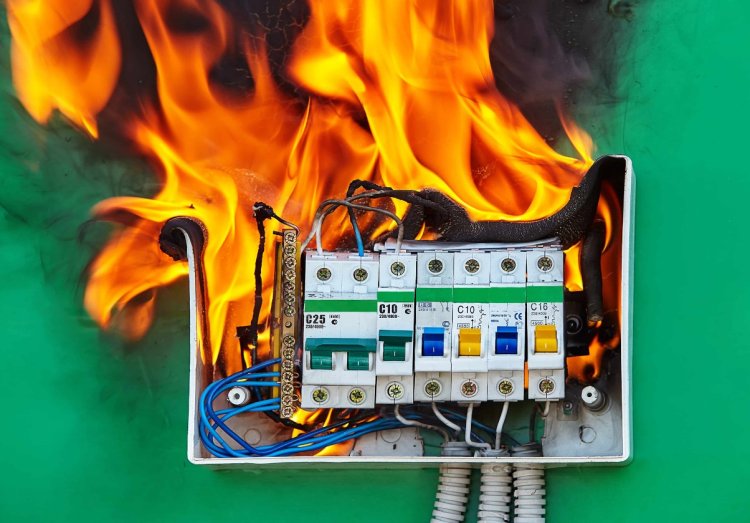Common Electrical Issues in Older Homes
If you're living in an older home, you may encounter common electrical issues that pose risks to your safety. Outdated wiring and insufficient capacity can lead to frequent problems. Upgrade and maintain your electrical system to ensure the safety and functionality of your home.

If you're living in an older home, you may encounter common electrical issues that pose risks to your safety. Outdated wiring and insufficient capacity can lead to frequent problems. Upgrade and maintain your electrical system to ensure the safety and functionality of your home.
Understanding the Electrical Challenges of Older Homes
You'll encounter a multitude of electrical challenges in older homes that can pose safety risks. One common issue is outdated wiring, which may not meet current safety standards and could lead to electrical fires.
Another challenge is inadequate electrical capacity to support modern appliances, causing overloaded circuits and potential hazards. Additionally, older homes often lack sufficient grounding, increasing the risk of electric shocks and damage to electronics.
It's crucial to address these issues promptly to ensure the safety of your home and family. Consulting with a qualified electrician in st albans to assess and update the electrical system can help mitigate these risks and bring your home up to current safety standards.
Outdated Wiring and Its Dangers
Outdated wiring can pose serious dangers in older homes, so it's important to be aware of the risks associated with it. Over time, older wiring systems can deteriorate, leading to frayed insulation, exposed wires, and potential electrical fires. These outdated systems may not be equipped to handle the power demands of modern appliances, increasing the risk of electrical overloads and short circuits.
Additionally, older wiring often lacks the grounding features found in newer installations, putting you at a higher risk of electric shocks. To ensure the safety of your home and loved ones, consider hiring a professional electrician to inspect and update any outdated wiring to meet current safety standards.
Don't ignore the potential hazards outdated wiring can bring to your older home.
Insufficient Electrical Capacity for Modern Needs
You may frequently experience tripped circuit breakers or blown fuses due to insufficient electrical capacity for modern needs in older homes. As you add more appliances and electronic devices to your household, the demand on your electrical system increases.
Older homes weren't built to handle the power requirements of today's technology, leading to overloading issues. Upgrading your electrical panel and wiring can alleviate these problems. A certified electrician can assess your home's current capacity and recommend necessary upgrades to meet your modern electricity needs safely.
Frequent Electrical Problems in Older Homes
Often, and but, older homes frequently encounter recurring electrical problems due to outdated wiring and outdated components. One common issue is flickering lights, which can be a sign of loose wiring or overloaded circuits.
You may also experience tripped circuit breakers frequently, indicating an electrical system that's struggling to meet modern power demands. Another frequent problem is the presence of ungrounded outlets, which aren't only inconvenient but also pose a safety risk.
Additionally, older homes often have outdated electrical panels that are unable to handle the electrical load required by modern appliances and electronics. To ensure the safety and efficiency of your home's electrical system, it's advisable to have a professional electrician inspect and upgrade any outdated components.
How to Upgrade and Maintain Electrical Safety in an Older Home
When considering how to upgrade and maintain electrical safety in an older home, it's essential to prioritize the safety of your household. Start by having a professional electrician conduct a thorough inspection to identify potential hazards such as outdated wiring, overloaded circuits, or faulty outlets.
Replace any old wiring with modern, safer alternatives to meet current safety standards. Install ground fault circuit interrupters (GFCIs) in areas prone to moisture like kitchens and bathrooms to prevent electric shocks. Upgrade your electrical panel to handle modern appliances and devices without overloading the system.
Regularly check for signs of wear and tear, like flickering lights or sparking outlets, and address them promptly to ensure the safety of your home and loved ones.
Conclusion
Overall, addressing common electrical issues in older homes is crucial for ensuring the safety and functionality of your living space.
By identifying outdated wiring, addressing insufficient electrical capacity, and staying on top of maintenance, you can prevent potential hazards and keep your home running smoothly.
Remember, it's always better to be proactive when it comes to electrical safety in older homes.
What's Your Reaction?



















.jpg)
